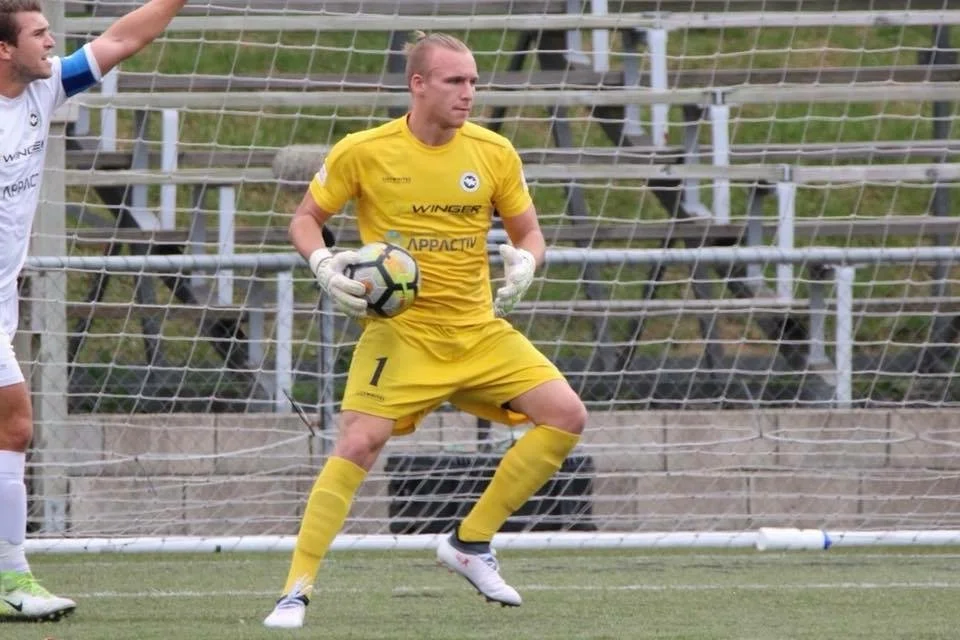Developing Confidence as a Goalkeeper: Overcoming Mistakes
Louie alongside Tim Payne (Wellington Phoenix FC) while they were both at Eastern Suburbs AFC playing in the National League.
At NZGKU, we remind our goalkeepers of a truth that separates the average from the elite: confidence isn’t something you’re born with — it’s something you train, just like footwork or handling. As a goalkeeper, you're often in the spotlight, and your role comes with unique pressure. A small misstep can lead to a goal, and that can feel like the weight of the world. But learning to handle those moments with resilience is what transforms a good goalkeeper into a great one.
Mistakes will happen — even at the highest levels of the game. But it's your reaction to those moments that truly matters. A strong mental game allows you to stay calm, bounce back quickly, and continue leading from the back. At NZGKU, we focus on helping keepers develop mental tools to overcome setbacks and play with unwavering self-belief.
Mistakes Happen — It’s What Comes Next That Matters
Every goalkeeper has experienced that sinking feeling — a misjudged cross, a mistimed dive, or a miscommunication that led to a goal. While it's easy to dwell on the error, great goalkeepers learn to shift their focus quickly from frustration to reflection. It’s not about ignoring the mistake — it’s about using it.
We train our keepers to replace self-blame with purposeful review. Instead of spiralling into negative self-talk, we encourage questions like:
Did I make the right decision under pressure?
Was it a technical error I can adjust?
What can I do differently next time?
This mindset turns every mistake into fuel for improvement.
1. Reframe the Mistake
The difference between a keeper who crumbles and one who grows is how they interpret their errors. Mistakes are not a reflection of who you are as a goalkeeper — they’re simply snapshots of a moment. By breaking the error down and understanding it, you take control of the narrative.
This approach not only helps you correct the technical issue, but it also builds mental clarity. Instead of thinking, “I always mess that up,” you’ll begin thinking, “I’ve seen this before — I know what to do next time.” That internal dialogue matters more than you realise.
2. Use Routine and Preparation
Confidence isn’t just about how you play — it’s also about how you prepare. At NZGKU, we encourage our athletes to build both technical routines and mental preparation habits that create consistency under pressure.
This could be visualising key moments before a game, practicing positive self-talk, or using a short breathing exercise before set pieces. The more consistent your routine, the more mentally anchored you become — no matter the situation. Preparation creates predictability, and predictability builds confidence.
3. Lean on Your Team
Goalkeepers are leaders, and leadership includes vulnerability. When something goes wrong, staying vocal and connected with your defenders helps rebuild confidence on both sides. A calm, clear communicator inspires trust.
We encourage our goalkeepers to stay loud and involved after setbacks. A keeper who continues organising, encouraging, and commanding their area sends a message: “I'm still locked in. I’ve moved on. Let’s go again.” That energy is contagious.
4. Celebrate the Comebacks
It’s easy to focus on what went wrong, but don’t forget to celebrate the recovery. A big save after a mistake is a statement. It shows character. At NZGKU, we love seeing our goalkeepers shake off an early error and go on to have a standout performance. Those are the moments that shape your identity.
Confidence is not about flawless performances — it’s about how quickly you bounce back. Turn the page fast, and you’ll build a reputation as a mentally strong and reliable keeper.
5. Focus on the Bigger Picture
One mistake does not define a goalkeeper, just as one save doesn’t define a career. It’s important to zoom out and remember why you’re here: to improve, to compete, and to enjoy the process. Keepers who stay focused on long-term growth don’t get derailed by short-term setbacks.
Keep a training journal, set personal goals, and track your progress. You’ll begin to see that one tough game is just a small part of a much larger journey — one that includes growth, resilience, and plenty of success ahead.
Confidence is Earned, Not Given
Confidence isn’t about being perfect — it’s about being prepared, resilient, and focused on growth. At NZGKU, we train our goalkeepers not just to stop shots, but to lead through adversity, recover quickly, and back themselves every time they step on the pitch.
Mistakes will happen. The question is — what will you do next?

